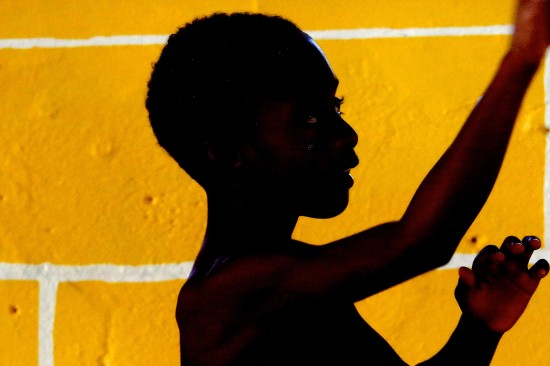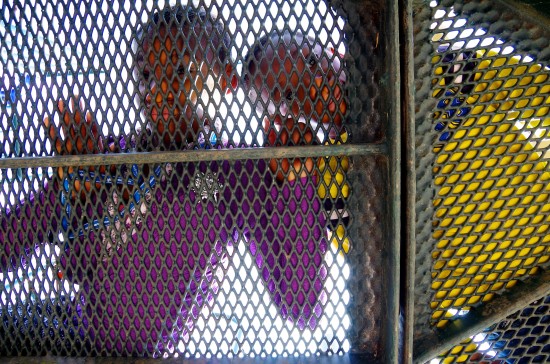
Don’t try to figure out what other people want to hear from you; figure out what you have to say. It’s the one and only thing you have to offer. —Barbara Kingsolver
Knowing what you want to say before you put your pen to the paper, click the camera shutter, or dip your brush in paint takes time to figure out, but it is well worth the effort. One of the criteria the Scholastic Awards jurors look for is a personal vision or voice, and this year’s Gold Medal Portfolio recipients’ works are speaking loudly and clearly. These works are personal and public; they focus on the small things in life and the big ideas. Over the next few weeks, we’re going to explore these works, and the artists and writers behind them, in their own words. Benjamin Bear and Edil Hassan will kick off our series on the 2015 Scholastic Awards’ Gold Medal Portfolio recipients.
Benjamin Bear is from Rockford, Illinois, and attends Auburn High School.
“My work takes a look at dissonance in the self and society. I question both the inner framework of myself and my surroundings to develop a better understanding of my identity and the world I am a part of. I refuse to be passive in my approach to photography; rather, I seek to document what people often choose to overlook: unrest, whether personal or external. I paint an imperfect picture, but that is what makes my work worth not just seeing, but experiencing.”

Edil Hassan is from Burlington, Vermont, and attends Burlington Senior High School.
“Somalia is in every part of me, especially in my writing. I want to convey through my works a sort of transgenerational trauma that all immigrants and the children of immigrants feel. I want to show longing and heartbreak, melancholy and violence through my writing, but I also want to show hope. Hope for new beginnings, hope for learning to love a place as much as the place you were born in. I wanted to explore what it means for me, a second generation immigrant, to process the experiences of my parents.
When people read my work, I want them to empathize with my writing. I want them to feel and understand what it means to hold onto experiences and stories not fully your own, but still have them be a part of who you are. Writing allows me to further understand the struggles of my parents and extended family, and also gives me a way to process and grasp what and where I come from. Writing makes me not forget that the stories and history of my parents and my own started long before we came to America.”
from “Letters I Have Yet to Send”
I. Dear Somalia,
We didn’t think it would happen. We didn’t ask for any of this,
to have to swallow our language to make room for a new one,
for our names, to be chopped in two,
our histories, reduced to identification cards.
We may never have asked for this, but neither did we ask to see you fall apart,
to gag and retch until we were heaved out of you,
a migration of violence spilling from the borders of your mouth.
It’s been 17 years since I saw you last, and I’ve cried enough tears
to fill the ocean that separates us three times over.
from Something Sacred in Their Words
Fatima’s uncle once told her that he saw God in his wife’s eyes. He said this to her after noticing the long rosary beads that always hung from her neck, reaching to her stomach, her fingers playing with the frayed string that held the beads together. You can never truly find God in any of your hymns or prayers, he had said. But you’ll find Him in your husband. Her mind travels back to his words as the silence of her home is broken by the holy man’s chants, his left hand on her head, and his right on her new husband, Fuaad. Her eyes scrunch in concentration to hear the man’s words, so that she won’t hear her uncle’s.
She looks at her husband for a moment through a squinted eye, before closing it quickly. He is taller than her, and she frowns at the idea of looking up at him to speak. He had gone to boarding school, spoke English that rivaled his teachers. Fatima knew him when they were young, but never exchanged words. But she had seen him each time he was in the village. She always observed him from afar, a rucksack on his shoulder, the indentations of a book inside.
She had never gone to school, though she could write with a shaky hand the six letters that make up her name. But she could sing scriptures in her sleep, and despite the callouses on her rough hands, she could heal anyone who was close to death. She wonders what they could possibly talk about for the next few decades of their life. She looks at Fuaad again, his black hair falling over his closed eyes, his brow creased in thought. Her uncle was certainly wrong.
Fatima’s in his bedroom now, having left her own house only a few hours ago. They walked to her husband’s home, at the front of a long procession of drums and shouts of laughter. Songs of blessings and love sung so loudly they stirred the clouds above. Fatima and Fuaad both held kerosene lamps to guide the way, the light of the lamps becoming brighter as the sky became darker. Fatima sang along, each song coming as easily to her as her own name. She could hear Fuaad’s voice, clumsily speaking the words under his breath. She laughed, not cruelly, and there was a smile in her voice. But he didn’t hear it, and closed his mouth. She spent the rest of the walk wanting to string together an apology but also not wanting the first thing for her to ever say to her husband to be I’m sorry.
